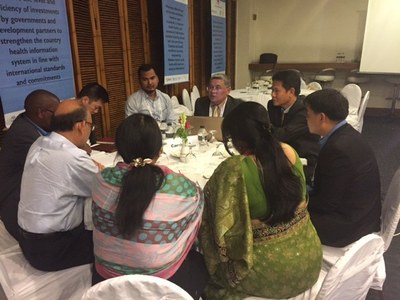Health through Measurement: Countries Learn How by Listening to Each Other
By Jim Thomas, PhD
 DHAKA, Bangladesh—In a world that is working to ensure health for all, what does progress look like? It might look like people from different nations sitting in tight circles, leaning in to hear each talk about their successes, failures, and challenges in strengthening their country health information system (HIS). In those stories, each listener can gain insights to apply in their own country. And bit by bit, year by year, their country can move towards a system that allows them to see data that describe the needs of their population, and whether health services are addressing those needs.
DHAKA, Bangladesh—In a world that is working to ensure health for all, what does progress look like? It might look like people from different nations sitting in tight circles, leaning in to hear each talk about their successes, failures, and challenges in strengthening their country health information system (HIS). In those stories, each listener can gain insights to apply in their own country. And bit by bit, year by year, their country can move towards a system that allows them to see data that describe the needs of their population, and whether health services are addressing those needs.
That scene was repeated many times at the Inter-Country Conference on Measurement and Accountability, held in Dhaka, Bangladesh, April 26-28, 2016. The meeting was hosted by the Bangladesh Ministry of Health and Family Welfare, the global Health Data Collaborative, the U.S. Agency for International Development (USAID), the German agency for international development cooperation (GIZ), and the Asia e-Health Information Network(AeHIN). They brought together several people from each of seven Asian and African countries to share their successes and challenges in collecting and using data to guide their public health programs. The motivation of the conveners was the global adoption of the UN Sustainable Development Goals (SDGs) in September 2015, and the subsequent launch of the global Health Data Collaborative to coordinate the efforts of countries and global donor organizations to work on how to measure the SDGs.
Recognizing that we learn best when listening to someone who has wrestled with similar challenges, the planners constructed the meeting around interactions among country representatives. A prominent theme in the conversations was the importance of the human factor in data systems. People discussed, for example, how initiatives to strengthen competition in the internet provider market could increase internet connectivity in rural areas and reduce costs. They swapped experiences with different governance structures for HIS, with developing national HIS strategies, and with mobilizing the political will needed to implement them. Participants recognized that while electronic systems are important, the thinking about public health objectives and strategies are paramount. People and planning are the horse, and informatics is the cart.
Eventually, each country identified and shared its top three actions to strengthen its HIS, incorporating what they learned around those conversation circles. Example priorities included finalizing HIS strategies, and empowering HIS units to develop and scale up digital HIS platforms. Through these discussions, participants identified connections between needs and potential resources.
On the final day, more than 60 participants traveled to see first-hand how Bangladesh is implementing tablet-based data collection systems by community-based health workers in health service facilities. The heat was sweltering but the group seemed not to notice as they actively exchanged ideas and reactions to watching a health systems strengthening project in action. The conference was widely considered to be a success: in large part because of those circles of ideas, stories of short- and long-term progress, shared challenges, and renewed determination to make things happen.
Jim Thomas, PhD, is the director of the USAID-funded MEASURE Evaluation project.
A new video, premiered at the Health Data Collaborative meeting in Dhaka, Bangladesh on April 27, tells the story of the RHIS Initiatives' introduction of mobile data collection for population registries conducted in rural areas in Bangladesh. See the video at https://vimeo.com/158974120.
Reprinted with permission from the Health Data Collaborative on April 28, 2016.












